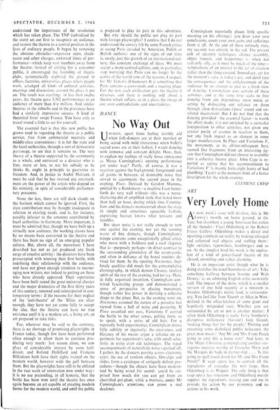No Way Out
DANCE USUALLY, apart from feeling terribly old when folk-dancers are at their merriest or being seized with mild irreverence when ballet's sacred cows are at their holiest, I watch dancing with immense and constant delight. How, then, to explain my feelings of really fierce annoyance as Merce Cunningham's opening performance got under way? Partly, of course, it was a reaction against the background, foreground and all points in between, of damnable noise that served to accompany the second piece in the evening, Place. Devised by Gordon Mumma, emitted by a Bandoneon—a machine I can hence- forth do very well without—this was a nerve- shattering din of amplified static that lasted more than half an hour, during which time Cunning- ham and his dancers manoeuvred about the stage in simple and sometimes agreeable fashion, expressing heaven knows what tensions and troubles.
But sheer noise is not really enough to turn one against the evening, nor yet the seeming waste of fine dancers, though Cunningham's troupe contains some exceptionally gifted artists who move with a boldness and a cool elegance that is—purposely perhaps—in direct contrast to the surrounding gimmickry of the avant-garde, and often in defiance of the banal routines de- vised for them. In the opening Nocturnes, their lovely qualities did much for the contemplative choreography, in which demon Chance, tutelary spirit of the rest of the evening, had no say. Here, in fully organised invention, Cunningham con- trived fascinating groups and demonstrated a sense of perspective in placing movement, though rather less power in devising a cohesive shape to the piece. But, as the evening wore on, Nocturnes assumed the nature of a paradise lost viewed from a hell of noise and posturing. If Place assaulted our ears, Variations V carried the battle to the other senses, pelting them, so to speak, with a series of old hats. For a reputedly bold experimenter, Cunningham shows little subtlety or ingenuity; the coarseness and blatancy of his means argue a reliance on ex- periment for experiment's sake, with small selec- tivity in using even old techniques. The taped accompaniment of naturalistic noise (sparked off, I gather, by the dancers passing across electronic eyes), the use of random objects, film-clips and slides, form a catalogue of antiquely defiant pro- cedures—though the objects have been modern- ised by being wired for sound: you'd be sur- prised how much din you can get from an electrified pot-plant, while a mattress, under Mr Cunningham's attentions, can prove a real deafener. Cunningham reportedly places little specific meaning on his offerings: you draw your own conclusions, count your own gains and sufferings from it all. At the end of these unlovely rites, my account was entirely in the red. The present cult of aleatory techniques, chance assembly, objets trouvds, and happenings is--when not radiantly silly, as it must he much of the time— symptomatic of an interest in the act of creation rather than the thing created. Immediacy, art for the moment's sake, is today's cry. and devil take the consequences and the enlightenment of the audience. In an attempt to give us a fresh view of dancing, Cunningham uses certain of these activities, and at the same time seeks to free dancing from any dependence upon music or setting by dislocating our reliance on them through alien distractions (`pure' sound and un- related decoration). But I do not find that the dancing provided--the essential factor—is worth the effort made; it is not enriched by a surrealist juxtaposition to other activities, not given any greater purity of essence in reaction to them, nor any fresh impact as an element in some larger manifestation. In Place and Variations V, the movement, at its all-too-infrequent best, seemed like fragments from an interesting jig- saw that Cunningham did not choose to assemble into a cohesive theatre piece. John Cage is re- ported as saying that his accompaniment to Variations V 'is mainly forty-eight hours of bad plumbing.' I can't at the moment think of a better description for the whole evening.
CLEMENT CRISP


































 Previous page
Previous page